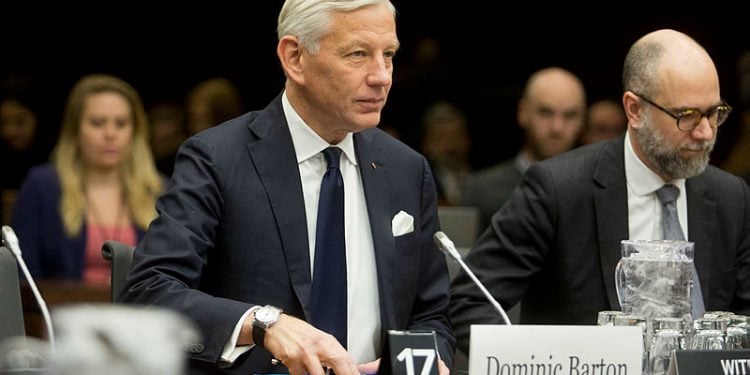Ottawa, December 10, 2020 – On December 8, Canadian Ambassador to China, Dominic Barton, testified before the Parliamentary Committee on Canada-China Relations on his recent visit to Tibet. The testimony started with a brief presentation by Ambassador Barton on what he observed during his three-day visit to Tibet’s capital Lhasa, followed by questions from the committee members about the visit and about Canada’s support for human rights in Tibet.[i]
Prior to the visit, Ambassador Barton and senior officials of Global Affairs Canada consulted with the Canada Tibet Committee on human rights issues in Tibet and on whether participating in such state-guided visits would be beneficial for Tibetans in Tibet. It was mutually agreed that any access to Tibet, opportunity to see and meet Tibetans in person, and the mere presence of foreign diplomats in Tibet would be worth pursuing.
“We should also remember that few Tibetans have had the opportunity to connect with foreigners. I felt that it was important for Tibetans to see that outsiders still show up and care deeply about their situation and for them to see that Canada cares. For these reasons, and as part of a broader engagement on Tibetan issues, I decided to go.” said Ambassador Barton in his testimony to the Canada-China committee.
The three-day program for Ambassador Barton and diplomatic representatives from eight other nations included activities in the areas of economic development, environmental protection, education, culture, and religion. A part of the program under the theme of economic development, Ambassador Barton met former Tibetan nomads who are relocated through China’s “poverty alleviation program.” The Chinese government asserts that all relocation and rehousing operations are entirely voluntary and respect “the will of the Tibetan farmers and herders.” It strongly denies that any forced evictions take place in the process, and suggests it is being culturally sensitive by stating that the design and appearance of the new houses suit “ethnic characteristics.” However, reports by international human rights groups and independent researchers, including Human Rights Watch[ii] and Adrian Zenz[iii], show that Tibetans are forced, coerced into mass rehousing and relocation program. Sophie Richardson, China director of Human Right Watch, said “The scale and speed at which the Tibetan rural population is being remodeled by mass rehousing and relocation policies are unprecedented in the post-Mao era. Tibetans have no say in the design of policies that are radically altering their way of life, and – in an already highly repressive context – no ways to challenge them.”
During the testimony, Ambassador Barton noted the recent motion[iv] on Sino-Tibetan dialogue passed by the Parliamentary Committee on Canada-China Relations as a positive development and voiced his support for the resumption of the Sino-Tibetan dialogue. In response to a question from MP Arif Virani on the promotion of the Sino-Tibetan dialogue, the ambassador said “I think we should keep pushing for dialogue, and, again, looking for this common ground because a lot of elements in that I think are what’s already existing in the Chinese Constitution about what is in an autonomous region, and to do it. Given the age of His Holiness and where it (dialogue) is, I think there is some urgency to that.”
Ambassador Barton added, “It felt pretty hard-line from the authorities when they talked about His Holiness and the group. They used pretty aggressive language, but I think we should urge for that dialogue to be able to find common ground.”
There have been a series of dialogues[v] between the representatives of His Holiness the Dalai Lama and the Central Tibetan Administration, and the government of the People’s Republic of China up until 2010. Despite China’s strong opposition to international pressure on the dialogue, various parliamentary committees from the U.S., Europe, Canada, and other groups have passed resolutions[vi] supporting the resumption of the stalled dialogue over the years. Tibetan groups in exile believe Canada is an ideal country to broker a negotiation between the two groups. “Canada, with practices of autonomy in its own land and with the image of being relatively a neutral country, is in a good position to push for the dialogue (notwithstanding the current tension between Canada and China)” said Sherap Therchin, the executive director of Canada Tibet Committee.
By Sherap Therchin
[i] Ambassador Dominic Barton testifies before the Parliamentary Committee on Canada-China Relations: https://parlvu.parl.gc.ca/Harmony/en/PowerBrowser/PowerBrowserV2/20201208/-1/34472?Language=English&Stream=Video&fbclid=IwAR3ST8wajVrcdvCOIOwdts-YjnUYOCAlE6REZv3VaxgF_mRmVcfgvLoKF6E
[ii] Mass Rehousing and Relocation Programs in Tibetan Areas of China: https://www.hrw.org/report/2013/06/27/they-say-we-should-be-grateful/mass-rehousing-and-relocation-programs-tibetan
[iii] Xinjiang’s System of Militarized Vocational Training Comes to Tibet: https://jamestown.org/program/jamestown-early-warning-brief-xinjiangs-system-of-militarized-vocational-training-comes-to-tibet/?fbclid=IwAR3C7I2BL1__v6PVIi83QjvRTJp-Y0WNvkWrCr4CNHXlVyZ4DpvyEYm7cvw
[iv] The Canada-China committee unanimously passes a motion supporting Sino-Tibetan dialogue: http://tibet.ca/en/library/media_releases/469
[v] Sino-Tibetan dialogue: https://tibet.net/important-issues/sino-tibetan-dialogue/
[vi] International Resolutions and Recognition on Sino-Tibetan Dialogue: https://tibet.net/important-issues/sino-tibetan-dialogue/international-resolutions-recognition-on-sino-tibetan-dialogue/

